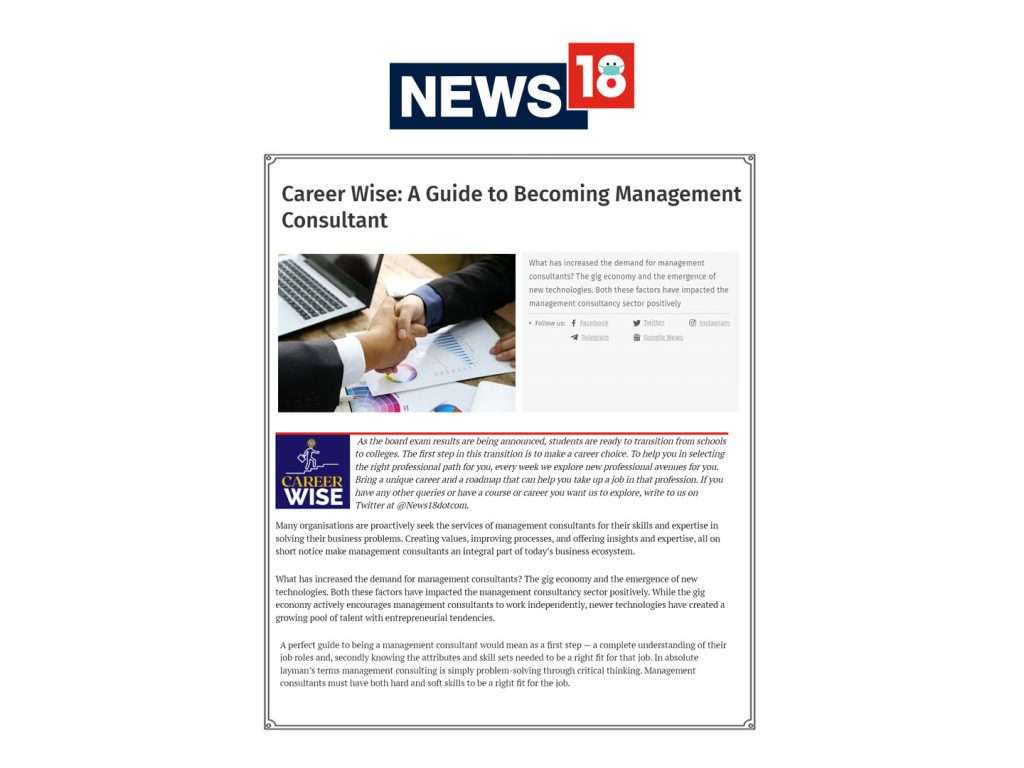Share
Career Wise: A Guide to Becoming Management Consultant

As the board exam results are being announced, students are ready to transition from schools to colleges. The first step in this transition is to make a career choice. To help you in selecting the right professional path for you, every week, we explore new professional avenues for you. Bring a unique career and a roadmap that can help you take up a job in that profession. If you have any other queries or have a course or career you want us to explore, write to us on Twitter at @News18dotcom.
Many organisations are proactively seek the services of management consultants for their skills and expertise in solving their business problems. Creating values, improving processes, and offering insights and expertise, all on short notice, make management consultants an integral part of today’s business ecosystem.
What has increased the demand for management consultants? The gig economy and the emergence of new technologies. Both these factors have impacted the management consultancy sector positively. While the gig economy actively encourages management consultants to work independently, newer technologies have created a growing pool of talent with entrepreneurial tendencies.
A perfect guide to being a management consultant would mean as a first step — a complete understanding of their job roles and, secondly knowing the attributes and skill sets needed to be a right fit for that job. In absolute layman’s terms, management consulting is simply problem-solving through critical thinking. Management consultants must have both hard and soft skills to be the right fit for the job.
JOB ROLE
Today’s business environment is more intensely buffeted by PESTLE forces. PESTLE is an acronym for ‘Political, Economic, Social, Technological, Legal and Environmental’ forces. In such an ever-changing landscape, businesses need to evolve and grow. Enter the management consultant. Management Consultants work with businesses to improve their performance by providing expert advice to solve problems.
They undertake macro-environmental and micro-organizational scanning to plan, strategize and deliver – solutions with agreed milestones. The start-off point would involve defining the problem, finding a series of alternate solutions, picking up the one most suited, hypothesising a proposed solution, developing an action plan, and assisting in implementing the same.
The area of work could be across a broad spectrum of businesses – trading, manufacturing, and services Industries. These could also be in various sectors such as engineering, banking, software, technology, etc. Within these, the consultancy could be function related such as finance, operations, marketing, HR, and technology.
ELIGIBILITY CRITERIA
— There are no specific qualifications to become a management consultant, but MBA qualifications would be ideal.
— If you want to take up consultancy in a specialised sector such as IT, engineering, or project management, then qualifications in these specialised areas are mandatory.
— A professional certification in management consultancy from reputed institutes would be useful. There are many institutes and colleges that offer short-term programmes in management consulting both in India and abroad. Further, there are many online courses as well with competitive fee structures, which an interested aspirant can take advantage of.
Some of the common certifications to get are the Certified Management Consultant (CMC) provided by the Institute of Management Consultants USA (IMC USA) or the Practising Management Consultant (PMC) by the Singapore Business & Advisors Council (SBACC).
— An internship with a consulting firm would be added advantage
REQUIRED SKILL SETS
— Ability to work under pressure and adhere to deadlines
— Must be able to work independently as well as in a team
— Must possess strong interpersonal skills and excellent communication both oral and written
— Must be commercially astute
— Be aware of the current business environment, especially with regard to markets, trade and policies.
— Quantitative and analytical skills
— Must be able to carry out research and data collection and analyse and do the number crunching.
— Must be adept in Microsoft Excel, Word, and PowerPoint
— Creative and out-of-the-box thinking
This is not an exhaustive list and the aspirant needs to add certain skill sets and qualifications depending on their area of consultancy. Management consulting is an extremely rewarding career in terms of job satisfaction and remuneration.
Read Full Article: https://www.news18.com/news/education-career/career-wise-a-guide-to-becoming-management-consultant-6340807.html



